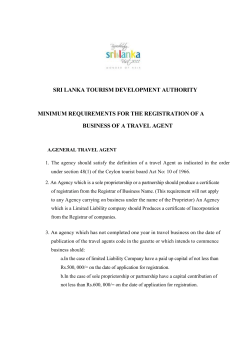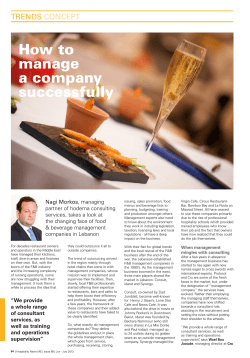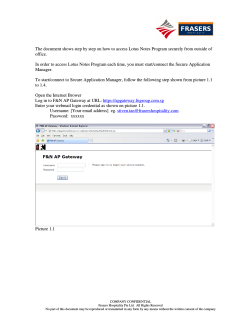
P R O F E S S I O n... How to ... organize an event
P rofessio n al How to ... Organize an Event What are the latest trends in the meetings industry? What about the prices? What is the outlook of the industry in such markets as Russia or even Sri Lanka? P rof essional : How to . . . O r g ani z e an Ev e nt Meeting Industry at the Crossroads F ew are the industries that can boast that the current economic crisis has not affected them, and the meeting industry is not one of these chosen few. During the boom years, pickings were rich, attracting numerous freebooters whose motto was “with cash, anyone can organize an event.” With event budgets plummeting Nov emb er, 2 0 0 9 and a growing demand for greater accountability, planners are now obliged to justify the events that they organize, provide added value and generate higher ROI, while facing up to stiffening marketplace competition, notwithstanding a process of natural selection sparked by the steep economic downturn. — 14 — Despite the pressures of survival in the current climate, new trends and approaches continue to emerge. This hardly means there will never be a return to the sumptuousness of yesteryear, but the idea of an event as a form of luxury hospitality is on the road to extinction. Arguably the most important industry movement resides in the differentiation between the tourist and meeting industries. Tourism is hospitality; meetings and events are investments. Although hospitality does play a sizeable part in the process, it is not the main objective. Companies invest in events to obtain value, and the planner’s job is to maximize this value for all stakeholders. As this can only be achieved through improving on format and content design, more than ever planners must reinforce or change participant behaviour so as to create significantly greater value for stakeholders. So, we encounter experiential marketing, or as defined by Wikipedia, the art of creating an experience that results is an emotional connection to a person, brand, product or idea. The concept originated in 2000, but the approach to connect with target markets is only just now generally acknowledged as a more effective method of reinforcing or changing behaviour than conventional media techniques. P rof essional : How to . . . O r g ani z e an Ev e nt i Germany Is Top Association Meeting Destination Outside U.S. The International Congress & Convention Association in Amsterdam has released its 2008 association meetings statistics, placing Germany once again at the top of the list for association meetings outside the United States. And Berlin remains the most popular meeting city in Germany. ICCA rankings cover meetings organized by international associations that take place on a regular basis and rotate between a minimum of three countries. As has been the case since 2004, the U.S. and Germany hosted the greatest number of association meetings (507 and 402 respectively). In the third and fourth positions are Spain, with 347 meetings, and France, with 334 meetings. In fifth place is the United Kingdom with 322 meetings. Ic c aw or l d.c om In fact, MPI’s EventView 2009 study shows that 53 percent of executives believe that event (or experiential) marketing is the best discipline to accelerate and deepen relationships with target audiences. Nevertheless, to be fully effective it requires large doses of creativity. As well as knowing how to present ideas to clients and convince them that they will create the value they are looking for, the pressure is on planners to be consistently creative. New technologies, when used correctly, also provide a way of improving participant experience. Blogs, social media, Web videos and platforms such as Twitter disseminate information and collect value feedback before, during and after event; QR codes retrieve leads; planners issue electronic tickets and conduct audience polls; and software Nov emb er, 2 0 0 9 programmes help with organization and management. The wise use of new technologies not only improves participant experience, but reduces costs, yet another basic requirement in the current economic climate, and one that is probably here to stay. Cost reductions aside, green initiatives promise to be more than a passing trend. Although the current crisis has slowed down the implementation of environmental initiatives, recent research—IMEX, Convention Industry Council, etc.—shows that — 15 — planners, participants (and sponsors) are increasingly aware of the impact that meetings and events have on the environment—above all as regards transport and organic and plastic waste—and are eager to collaborate in green programmes. Given budget restraints, expensive carbon footprint offset programmes can be cost prohibitive, but there are a large number of less ambitious initiatives that can make a difference, such as harnessing new technologies to cut back on paper-based methods of data collection and promotion, recycling food waste, substituting drinking fountains for bottled water, using recyclable badges and lanyards or even choosing a closer destination or venue to cut back on transport costs and pollution. Every bit counts. Ironically, one of the chief side-effects of the current economic maelstrom will be an increase in competition. Many planners will have fallen by the wayside, but event stakeholders will continue to demand innovating experiences that provide them with maximum value at lowest possible cost. This is the challenge that planners will be expected to face in the future, and to achieve all event objectives, many will find it necessary to hone their professional skills. With initiatives such as MPI’s CMP certification programme and Maarten Vanneste’s Meeting Architecture manifesto, the professionalization of the industry is now a reality, and ultimately, it will be up to individual planners to keep up with the pace of change. By Thomas MacFarlane (Partner and content manager of Event Planner Spain) http://www.eventplannerspain.com P rof essional : How to . . . O r g ani z e an Ev e nt Interview: Organising an Event during Tough Times M ore than ever, achievements and good work needs to be praised and rewarded, lifting employee morale and boosting their motivation to continue performing during this period of economic decline. At the moment, times are difficult. The global financial crisis has been one of those major occurrences that has affected everyone, and in so many Nov emb er, 2 0 0 9 ways. It has driven economies around the world downwards, and forced many institutions to cut back on ‘unnecessary’ expenses. No doubt, many companies would deem participation at an industry event as somewhat unnecessary, especially when budgets are scarce and the near future is still very much an uphill road. Tourism and hospitality industries have certainly not been an exception. New developments have slowed down, postponed or cancelled altogether, whilst performances have progressively diminished. Organising an event, of course depending on its magnitude, is a huge task even at the best of times. Immense planning and preparations, organisation, marketing, relations, logistics, contacts, followups…the list goes on. Although many events might seem as though they are perfect, the reality is exhaustive amounts of work is required. The original challenge is to make an event interesting and beneficial; to provide value for participants – guests, sponsors and speakers. However now, during this economic crisis, event organisers must battle much harder to convince their audience and markets that this added expense is worthwhile. Beyond this, an industry event specialised in the tourism and hospitality industry, welcomes international guests who are themselves event organisers, or at least regular visitors to other similar events. — 16 — MKG Group’s Bruno Courtin tells us more about what other challenges are involved in organising events, as well as some advice on what to focus on. MKG has been organising both the Worldwide Hospitality Awards and Global Lodging Forum for over ten years. How many people are you expecting at each event? The Hospitality Awards gather over 700 top level executives from France and abroad, whilst Global Lodging Forum used to be limited to 300 participants, mainly due to venue size. The change of venue now will increase participation. Despite the current state of the economy, this is an actual increase from previous years, as we have managed to prove to the industry that such events are even more important now. How far in advance must you start planning to organise each event? As soon as the latest one is over. The first advisory board for the Hospitality Awards is programmed i MKG Tips & Hints 1.Thorough planning and brainstorming 2.Choose the right venue and timing 3.Extensive Marketing & Promotions 4.Organisational & PR initiatives on the day 5.Post-event evaluation – measure success P rof essional : How to . . . O r g ani z e an Ev e nt i Worldwide Hospitality Awards Organised by the MKG Group, the Worldwide Hospitality Awards were created 10 years ago to serve as a benchmark platform for the industry and in every aspect of hotel operations. The Hospitality Awards pay tribute to new initiatives and experiences, awarding the finest achievements, in not just major hotel groups, but also independent properties. It is indeed a channel or medium to expose excellence, but also an opportunity for the industry to unite, network and learn from each other. The 2009 Worldwide Hospitality Awards will take place at InterContinental Paris Le Grand on November 25th. Nov emb er, 2 0 0 9 after the last session of the Global Forum. And the sessions for the Global Lodging Forum are finalised by October the year before. What is involved in the planning stages of the event? A lot of work actually! Plenty of sweat, anxiety, stress, imagination, and of course contact with industry leaders, as well as with actual and potential sponsors. For such events, you must create a real buzz, especially when working with the hospitality — 17 — industry. It is crucial that each event attracts leading figures and personalities, as this will then have a domino-effect and draw other participants. Thus, exposure is fundamental – marketing and promotions – to make sure the industry is aware of what’s happening. This year’s event has been more challenging, and we’ve had to work very hard to make people commit. We knew this was going to happen, so we put in the extra effort and tried new strategies. At the same time, due to a slowdown in per- P rof essional : How to . . . O r g ani z e an Ev e nt i Global Lodging Forum For over a decade, the Global Lodging Forum has been the only international platform staged in France to facilitate a close encounter between the various business areas of the hospitality industry, i.e. operators, financial institutions, real estate and developers. Over 400 leading decisions makers gather to exchange information and strategies on European and global issues. The event was previously held at the Press Club de France in Paris and also the acclaimed Four Seasons George V. However, in order to host a larger audience, the 2010 Global Lodging Forum will be at Le Pullman Tour Eiffel in early March. formance, it has been slightly easier to negotiate deals with suppliers. What challenges do you regularly face in organising these events and how do you normally overcome them? To stage a bigger and more impressive event each year, as the event’s prestige is at stake, as is our company’s reputation. There are also many competitors always trying to mimic what you do, so you must stand-out above the rest and clearly communicate your position as the number one. The secret to successes is no doubt a lot of hard work, ef- Nov emb er, 2 0 0 9 ficient planning and creativity, as well as of course regular participation of highly acclaimed guests, which we always achieve. What happens at the event; are you still running around organising bits and pieces, and are there any new challenges? We must make sure presentations are accurate and debates relevant to topics. We have up to 60 different panel members with six different moderators for the parallel sessions. As you can imagine, this alone is a major challenge, requiring focus, attention to detail and spontaneity. We must also make sure that all participants feel comfortable and are enjoying the experience. It must be educational and informative in a friendly atmosphere. What usually happens after the event; as in what follow-ups you must do? The main problem we face, considering the size of the team is to capitalise on the success of these events. We do follow up on contacts, relations with candidates and all guests, but we could do a lot better. This part is much underrated when organising an event, but in my opinion, something that will drive a long-lasting successful event. http://www.mkg-group.com — 18 — P rof essional : How to . . . O r g ani z e an Ev e nt Russian В2В Events Market: Tendencies & Prospects R ussian market of specialised events has already been established. Russians indeed can create big and impressive events: large-scale economic forums, music festivals, and presentations. When an order comes from an important corporation or from a country, with the huge budget provided and so-called “administrative resource” involved, these events meet or nearly meet high international standards. Nov emb er, 2 0 0 9 Problems can however emerge when you represent a small business and you need qualified assistance in organization of specialized business event (round table, seminar, etc.). In Russia nowadays there are a lot of full service event agencies, seeking to deal with all the event marketing at once – weddings, jubilees, corporate meetings, theme parties. Business event usually occupies one of the last places in the service list of such companies. — 19 — While in some other parts of the world, in particular in Europe and in the USA, the industry of B2B events is well developed, in Russia it is still a developing one. Companies’ expenses for BTL (‘below the line’) and ATL (‘above the line’) in Russia are 22% and 78% respectively. Just to compare, the same numbers for the USA are 60% to 40%, for Europe – 49% and 51%. However, we see it as a prospective market, able to make a statement within the next 5 years, notwithstanding crisis effects, and we assume that the interest towards BTL services will only increase while the importance of ATL will steadily decline. Nowadays more and more foreign companies see Russian market as a priority for their development, thus, qualitative services in the field of business event marketing become as important as ever. When entering a new market, it is vital to understand the local specificity, find common language with partners, and choose the right approach to clients. Such goals can not be achieved only through simple advertising. Organisation of a small or medium size focused event can bring incomparably more output, and it is much more efficient either for promotion of a single company, or for development of new markets and directions of activities. Organisation of an event itself is not an easy task for a company working in other sphere, e.g. for a manufacturer. The right choice of venues and time, well drawn up programme, interested target audience, reliable providers and exceptional logistics – Nov emb er, 2 0 0 9 — 20 — P rof essional : How to . . . O r g ani z e an Ev e nt Around the world in 4 days Explore a world of business opportunities at WTM 2009 Meridian Club membership at World Travel Market allows travel industry buyers to network, negotiate and strike deals with exhibitors in a business focused environment. Meridian Club member benefits include: • Complementary Welcome Pack, including the WTM Catalogue (worth £26) • Dedicated Meridian Club lounges with free internet access, newspapers, chair massage, shoe shine, refreshments and hospitality including the M-Bar. • Exclusive access to meeting room facilities • Networking events with exhibitors • Discounted access to WTM’s Thursday’s paid conferences • Exclusive free travel voucher and motivational speaker session on Thursday 12 November ExCeL London 9-12 Nov 2009 Register for free entry at www.wtmlondon.com/tr Official Media Partner P rof essional : How to . . . O r g ani z e an Ev e nt only combination of all these components can be a keystone of success. Unfortunately, by now not too many Russian event companies can endure international quality standards. Incompetence of managers, undeveloped network of providers, absence of enough state-of-the-art congress venues, tendency to overblow a project budget – all these factors characterize Russian event market not from its best side. Event management in Russia is not considered as a substantive profession in full sense of the word; principles and requirements, obligations and the code of honor in the event industry are still to be established. Moreover, potential clients themselves – companies interested in promotion and development – now only begin to understand advantages of turning to professional agencies for arrangement of their own business events. Regarding classification of the Russian business event market products, it is pretty simple: most of the event agencies will offer you a basic selection of events types – conference, round table, seminar, promo action. Most of the scenarios suggested will not pretend to be original or brand new, e.g. official welcome speeches, plenary sessions with Nov emb er, 2 0 0 9 impressive number of speakers, formal moderation of sessions, evening reception in grand style in a palace or in a museum, plus maniac tutelage of VIP guests, sometimes carried to the point of absurdity (often they can hardly talk to other participants, being under such a “special” conditions). So, the conference part is quite predictable; it is a rare case when some interesting variations are introduced. As long as the intention to make something special exists, it takes shape in the most simple (in terms of creation) yet the most costly result – expensive gala reception. This trend can be well observed in St. Petersburg that affords beautiful palaces for holding gala events. The costs of renting a hall in a palace for 250 participants vary between 7,000-10,000 Euros. Naturally, any increase of the budget leads to the increase of the registration fee. Virtually, it turns out that the major part of the registration fee goes to cover meals and the rent. However, participants should pay for something else, namely, for the possibility to meet partners, clients, form perspective contacts and projects, in general, for the development of their businesses. Unfortunately, often this is not what happens and many participants leave having failed to obtain the aim. Such a situation adversely affect the industry of business events, as after attending several conferences without achieving the goals, many entrepreneurs develop a certain stereotypical image which is hard to change in future. This very situation, alas, characterize the Russian present-day reality: numerous congress events with expert topics about investment climate or economic situation, a lot of competing sector events held within the same month or even the same dates; same speakers with similar presentations at different events, absence of direct communication and lively discussions. — 21 — Recently we have had an honor to undertake assignments of experts of a European event company while preparing an international conference in St. Petersburg funded by the European Commission. This experience demonstrated huge differences in principles and approaches to the organization of business events in Russia and in Europe. Problems started emerging at the very initial stage, when organizers from the Russian side began promoting their providers of equipment, catering, transport and printing services. They were not willing to make at least a comparative analysis of other companies’ offers. Some of the providers were given special instructions on how to work with the experts. All of our proposals concerning logistics were rejected. The situation got to absurdity when, for example, prices for transport services during negotiations within the single day fell from 14,000 to 2,800 Euros. Problems may appear even with high level congress venues, provided by 5-star hotels, i.e. un- i Survey: Content Rules & Procurement Reigns Relevant and engaging content is key to successful events, while the influence of procurement is rising. These are two of the key messages from a new survey of 600 events buyers from corporates and associations, which also produced a number of other interesting findings. With 60% of UK corporate and 54% of association buyers citing reduced budgets as their key concern for the next 12 months, it is no surprise that venue and supplier cancellation policies and terms and conditions were also revealed as a high priority to event planners by the British Meetings and Events Industry Survey (BMEIS). One surprising result of the survey was a slight increase in overall budget for the association sector, up by 0.5% in the last 12 months. This contrasts with a 1.9% reduction in event budgets in the corporate sector. Me e t insre v i e w.c om P rof essional : How to . . . O r g ani z e an Ev e nt qualified technical personnel, cold coffee and mess in the events department. With one of such hotels our clients could not finalize payments within a week after the event, as the hotel’s management could not provide relevant calculations. Of course, cases described above are not typical for the Russian event industry, and the quality of the services improves each year. The main thing is that the approach of the companies towards their work is being changed, and aspiration to high quality and good business reputation begin to prevail over the desire to make a scoop. As regards the prospects, we consider B2B meetings to be a promising direction. In Russia they are sometimes called Business Contacts Exchange or Partneriat – cost-effective, targeted, short-term business meetings with a limited number of participants. They allow every participant to establish personal contacts with potential partners. Such kind Nov emb er, 2 0 0 9 of meetings has already become a natural part of business life almost worldwide; in Russia this segment is only in the initial phase. Usually large exhibition companies are interested in this type of meetings, since they want to attract professionals and try to create special site for negotiations. We hope that professionally prepared B2B meetings will become demanded even more, and that their share in the overall mass of congress events will increase. What can encourage such a process is the current economic situation when marketing budgets of companies were considerably reduced but the demand for communication, up-to-date information, new clients and partners still remains on the agenda. In general it should be admitted that Russian market of the event industry is a developing one, and it undoubtedly has some specificity of the “infancy” period. However, from our point of view, general evolution of the industry is evident, and the world economic crisis will give an additional impetus not only to the development of new directions, but also to emerging new actors. Considerable interest of foreign companies in the Russian market even nowadays ensure significant number of business missions and international events, aimed at the development of mutually beneficial cooperation. Thus, B2B cost-effective short-term industry meetings are supposed to be the most efficient way of promotion and establishing new contacts. By Valentina Gorchakova & Vladimir Antchak (Globus Eventi) http://www.globus-eventi.com — 22 — P rof essional : How to . . . O r g ani z e an Ev e nt WTM: Towards Sustainable Event Management The organising of tourism events has changed dramatically since World Travel Market first opened its doors 30 years ago. As it has the travel industry, the internet has revolutionised the way the events industry has positioned and marketed its exhibitions. Prior to the internet there was no focal point for an event before it took place, where exhibitors and visitors could visit to find out the latest information. Today a website is the shop window for all exhibitions as it is for all commercial organisations. Like the travel industry the events and exhibitions sector relied on brochures, I can remember scrutinising exhibition promotional brochures the same way a newspaper editor in Fleet Street would before sending it to the presses. Today, direct marketing is conducted via email meaning information is far more up to date and al- Nov emb er, 2 0 0 9 lows us to have a more personal relationship with our exhibitors and visitors. The biggest challenge today is the impact the current financial uncertainty has had on the travel industry and in-turn the exhibition sector. Organisations’ scrutiny of their marketing budget means the days of companies exhibiting at events every year without evaluating its success have long gone. At World Travel Market, the premier global event for the travel industry, we have always been committed to offering our exhibitors value and making sure they receive a high return on their investment in WTM. We work closely with all our exhibitors to make sure they are meeting all their marketing, branding and public relations objectives. Ultimately, most exhibitors equate the success of an event by the number of senior industry buyers they met and the volume of business conducted and deals signed. Due to this we make sure exhibitors have a range of opportunities to talk to the industry senior buyers, who are all members of WTM’s Meridian Club. Last year we changed the admission policy with access on the first day of the show by exhibitor-invite only. While this year we have introduced speed networking for the first time, which has been over subscribed with Meridian Club members looking to open negotiations with WTM exhibitors. This focus has left us in a strong position during the current financial uncertainty, with our high exhibitor satisfaction levels and our very low churn — 23 — rate meaning we will be celebrating our 30th anniversary this year with a high number of exhibitors who have supported the event for much of the past three decades. Success for an exhibitor is high exhibitor and visitor satisfaction with exhibitors and visitors retuning year after year. WTM 2008 took place with the backdrop of the global financial uncertainty, despite this it was the largest event ever with almost 50,000 participants and more than 5,600 exhibitors. The final major change in the exhibition industry over the past 30 years is the focus on providing a sustainable and environmentally-friendly event. World Travel Market led the travel industry when it launched Environmental Awareness Day in 1994 (renamed World Responsible Tourism Day in 2004), which is still the only international day of action of its kind. P rof essional : How to . . . O r g ani z e an Ev e nt i Executives: Face-to-Face Meetings Are Best When the goals of a meeting include persuasion, leadership, engagement, inspiration, decision-making, accountability, or candor, U.S. business executives overwhelmingly believe that holding a face-toface gathering is the only way to go. In a June 2009 survey of 760 executives from businesses of all sizes, Forbes Insights found that 84 percent of them prefer in-person, face-to-face business meetings, citing those as more effective than web conferences, videoconferences, or teleconferences for reaching a dozen goals, including those listed above. However, technologyenabled meetings have their place as well. The respondents deemed virtual meetings best for “information dissemination” and “data presentation.” Me e t ingsn e t .c om This time we are leading the exhibition industry with WTM looking to be one of the first exhibitions to achieve the new British standard for sustainable event management – BS8901. WTM 2009 will be marked against the BS8901 framework for events, venues and suppliers considering economic, environmental and social impact the exhibition has on its local community. Nov emb er, 2 0 0 9 World Travel Market is working alongside its exhibitors to achieve a sustainable event and is set to be the first ExCeL – London event to achieve the BS8901 standard. By Fiona Jeffery (Chairman of World Travel Market) http://www.wtmlondon.com/ — 24 — P rof essional : How to . . . O r g ani z e an Ev e nt Sri Lanka Events: Low Cost and Exotic Sri Lanka has not been on the list of top destinations for congresses and conventions for a long time. As a result of the latest changes in the security situation, the country starts opening up in numerous areas offering unique experience. Holding a business conference, meeting, or promotional seminar in Sri Lanka today has many advantages mainly because of the extremely low prices not only at five star hotels. Nov emb er, 2 0 0 9 The prolonged so-called "war" with the terrorist tigers (LTTE) has caused the once-thriving tourism industry to virtually come to a standstill for the past 26 or so years, and the competition for the limited number of tourist arrivals into Sri Lanka has resulted in some of the lowest rates at luxury hotels, compared to any other comparable destination in the world. For instance, right next door in India, you would be lucky to get a room at a five star hotel in any major city for less than $200 a night. In Sri Lanka, rates are presently running around $60 to 80 per night, for some of the best five star hotels in Colombo city. Additionally, Sri Lanka enjoys extremely low airfare rates from many countries in the region, and in certain cases, for instance India, it is actually cheaper to hold your group event in Sri Lanka, than in India itself! Sri Lanka boasts some of the most inviting, friendly people in the world, and some of the most spectacular scenery that can be seen on one small island, where it is possible to go from the beach to a cool mountainous climate in under three hours! The key to holding a successful group conference, meeting or seminar is to firstly, anticipate every possible requirement of all the candidates before it is even asked for, and secondly, to provide — 25 — every single requirement to each participant, from the moment of their arrival in Sri Lanka, right up until their departure. To maximize comfort and enjoyment for all the participants, the tour company should have an idea of the median age group of the participants, as well as their basic interests, etc., so that all sightseeing and leisure activities can be tailor-made to suite the participants needs & requirements. So why not to explore the possibility of an exotic destination such as Sri Lanka for the next large group convention, meeting or seminar, where you would probably maximize the participants satisfaction, and save money at the same time! By Sam Sultan (Managing Director, Exotic Tours) http://www.ExoticTourSriLanka.com
© Copyright 2025













